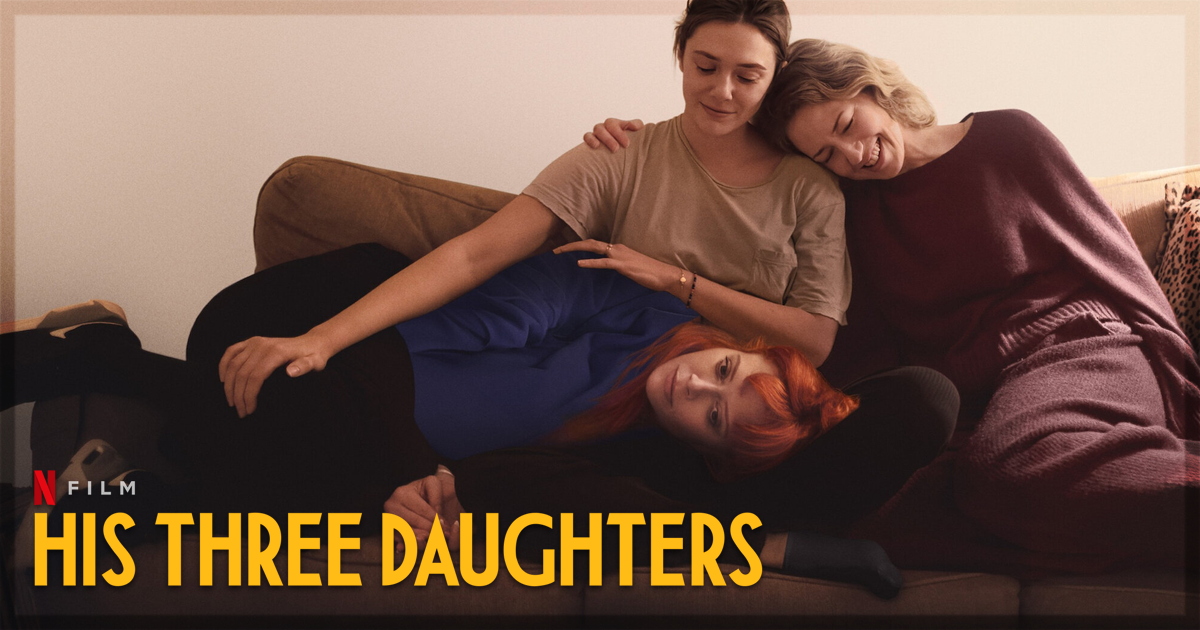All cinephiles have certain filmmakers or actors whose names alone are enough to make us sit in any theater or couch without knowing anything else about the film. Elizabeth Olsen (Captain America: Civil War) is that celebrity for me, as I consider her one of the best actresses of her generation and one of the most underrated actresses working today, alongside Carrie Coon (The Leftovers) and Natasha Lyonne (Orange is the New Black), as proven by His Three Daughters, an original movie written and directed by Azazel Jacobs (French Exit).
It’s a bittersweet story about a father with cancer and his three adult daughters who reunite at the family home to spend his final days together. Katie (Coon) is an extremely controlling mother with a rebellious teenage daughter; Christina (Olsen) is a completely different kind of mother, separated from her daughter for the first time in her life; and Rachel (Lyonne) takes refuge in cigarettes and sports betting, spending all her time indoors – something that frustrates her sisters due to their different views on how one should live.
His Three Daughters carefully explores the family dynamics between this main trio within the small confines of the apartment – only leaving the living room for brief moments, with the only exterior being a bench in the condominium’s courtyard where Rachel goes to smoke. It may sound cliché to describe the film as a “performance showcase” for the actresses, but it’s the most obvious, indisputable truth. Coon, Olsen, and Lyonne handle their numerous monologues and dialogues with phenomenal technical skill, creating an incredibly palpable, emotional connection with the audience.
As the youngest sibling of three, I assumed I would feel more connected to one of the sisters. However, His Three Daughters avoids many of the formulaic traps of this type of narrative, not falling into some stereotypes like the youngest being always the most spoiled, the eldest the most respected, or the middle child the most ignored. Jacobs’ script excels in making the three protagonists relatable in completely different ways.
I saw myself in Katie’s unfair assumptions, often making the mistake of jumping to conclusions out of frustration instead of simply asking why something happened a certain way or why someone acted in a certain manner. I related to Christina’s overly empathetic attempts to pretend “everything’s fine” when nothing in her life really is. And I connected with Rachel’s choice to accept criticism and feel her sisters’ negative judgment in order to avoid more drama when the important thing was taking care of their father.
His Three Daughters is a fantastic exercise in personal reflection, where viewers can follow not one, not two, but three unique perspectives of family members with dissimilar views on what it was like to live with their father, as well as completely independent methods of preparing for the incoming grief. Amidst so many differences, there’s something common between the three sisters: the difficulty of expressing themselves honestly to each other, sweeping any strong emotions under the rug, running away – sometimes literally – from the subject matter at hand with a casual “forget it, it’s not worth it,” or even throwing out passive-aggressive remarks.
The tension builds until, naturally, it erupts into more heated arguments, but also genuinely amusing conversations about each sister’s experiences with their father. Jacobs’ screenplay also deserves praise for how essential family revelations are conveyed to the audience. His Three Daughters gradually lays its cards on the table, explaining – without resorting to cheap or forced exposition – why the sisters relate to each other the way they do… without actually explaining why, but simply mentioning certain family facts or letting the actor’s expressions do the work that immediately leads to obvious conclusions for the audience.
His Three Daughters holds one of the most thought-provoking, stirring scripts of the year. Rich in captivating, thematically resonant dialogue, yet elevated by three actresses whose names deserve to be heard throughout the awards season. It’s impossible to highlight just one. Being partial to Olsen, the truth is that her character is the most emotionally exposed and has *the* scene that brought me closest to tears. That said, Coon might deliver the most complete performance – needing to be very versatile – while Lyonne offers the most complex, by far, being the actress most forced to hold back before exploding in the second half of the movie.
Jacobs uses the claustrophobic space of the apartment to enhance her directorial strengths, taking advantage of the fact that much of the film takes place in a single location to create a growing tension that’s tangible enough for any viewer to start feeling anxious at the sisters’ stubbornness in finally resolving their disagreements. His Three Daughters also conveys an important life lesson about time wasted on frivolities caused by misunderstood feelings, leading to the distancing of relationships that have everything to be healthy and positive for both sides.
It’s one of the best films of the year. It loses some momentum in the second act due to the repetition of certain scenes – though, in part, they’re deliberate and even represented by a secondary character – and there’s a sequence with the father near the end of the movie that ventures into fantasy, slightly detracting from the realism felt up to that point. His Three Daughters hits us in the heart with the reality of the sisters’ disparate experiences, not with “tricks” to shock the audience, making this particular scene feel a bit more forced. A small note that in no way affects the overall recommendation for all types of audiences – and, preferably, without knowing anything in advance.
Final Thoughts on His Three Daughters
His Three Daughters is a deeply moving, human portrait that does justice to the extraordinary talent of its cast. By exploring the complexities of family dynamics and inevitable grief, the film has an overwhelming impact due to its intimate, emotionally honest story. It’s a bittersweet, reflective, incredibly relatable journey, capable of touching on universal and personal issues with rare authenticity. Azazel Jacobs delivers one of the most memorable movies of the year, where Carrie Coon, Elizabeth Olsen, and Natasha Lyonne shine brightly, leaving a mark on the audience that will linger long after the final credits.
Rating: A-
His Three Daughters is now playing in limited theaters. It will be on Netflix on September 20th.
Learn more about the film at Netflix’s site.


